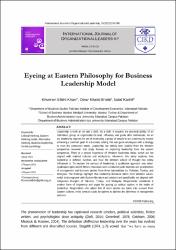| dc.contributor.author | Ellahi, Khurram Ellahi | |
| dc.contributor.author | Khalid Bhatti, Omar | |
| dc.contributor.author | Kashif, Sadaf | |
| dc.date.accessioned | 2021-11-29T08:15:36Z | |
| dc.date.available | 2021-11-29T08:15:36Z | |
| dc.date.issued | 2021 | en_US |
| dc.identifier.citation | Ellahi, K. E., Khalid Bhatti, O. ve Kashif, S. (2021). Eyeing at eastern philosophy for business leadership model. International Journal of Organizational Leadership, 10(3), 278-298. | en_US |
| dc.identifier.issn | 2383-1103 | |
| dc.identifier.issn | 2345-6744 | |
| dc.identifier.uri | https://hdl.handle.net/20.500.12511/8584 | |
| dc.description.abstract | Leadership is both an art and a skill. As a skill, it requires the practical ability of an individual, group, or organization to lead, influence, and guide other individuals. As an art, leadership requires the art of motivating a group of people to act unanimously toward achieving a common goal. In a business setting, this can guide employees with a strategy to meet the company's needs. Leadership has widely been studied from the Western perspective; however, this study focuses on exploring leadership from the eastern perspective. There is a certain hegemony of Western leadership ideas, which are not aligned with oriental cultures and workplaces. Moreover, this study explores how leadership is defined, evolved, and how the Western school of thought has solely influenced it. To explore the concept of leadership, a qualitative approach was taken. Qualitative open-ended fifteen interviews were conducted with theorists and practitioners of management and business studies from three nationalities i.e. Pakistan, Turkey, and Malaysia. The findings highlight that leadership literature stems from Western values, which is incongruent with Eastern literature and wisdom and specifically not aligned with indigenous thoughts of Pakistan, Turkey, and Malaysia. Respondents considered it another form of hegemony and urged for pacing up critical studies in the realm of leadership. Respondents also added that if more studies are taken into account from Eastern cultures, more avenues could be opened to address the dilemmas in management sciences. | en_US |
| dc.language.iso | eng | en_US |
| dc.publisher | Canadian Institute for Knowledge Development (CIKD) | en_US |
| dc.rights | info:eu-repo/semantics/openAccess | en_US |
| dc.rights | Attribution 3.0 Unported | * |
| dc.rights.uri | https://creativecommons.org/licenses/by/3.0/ | * |
| dc.subject | Critical Thinking | en_US |
| dc.subject | Eastern Thinking Model | en_US |
| dc.subject | Alternative Thinking | en_US |
| dc.subject | Business Leadership | en_US |
| dc.subject | Social Psychology | en_US |
| dc.title | Eyeing at eastern philosophy for business leadership model | en_US |
| dc.type | article | en_US |
| dc.relation.ispartof | International Journal of Organizational Leadership | en_US |
| dc.department | İstanbul Medipol Üniversitesi, İşletme ve Yönetim Bilimleri Fakültesi, İşletme Bölümü | en_US |
| dc.authorid | 0000-0002-2409-6532 | en_US |
| dc.identifier.volume | 10 | en_US |
| dc.identifier.issue | 3 | en_US |
| dc.identifier.startpage | 278 | en_US |
| dc.identifier.endpage | 298 | en_US |
| dc.relation.publicationcategory | Makale - Uluslararası Hakemli Dergi - Kurum Öğretim Elemanı | en_US |



















